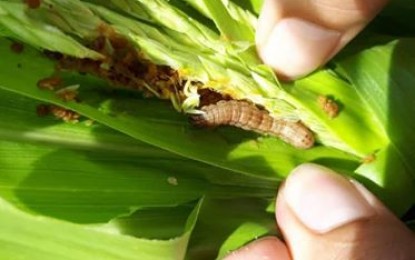
PNA file photo of fall armyworm.
DAVAO CITY – The Department of Agriculture (DA) 11 (Davao) has activated the Task Force Fall Armyworm (TF-FAW) to control the infestation in several areas in the region.
In a statement on Friday, the DA-11 said the task force has also been tasked to monitor the infestation at the border areas of Soccsksargen, especially the provinces of Sarangani, North Cotabato, and South Cotabato, where the infestation has devastated corn and other crops.
The task force consists of personnel of the Regional Crop Protection Center (RCPC) under the Integrated Laboratory Division (ILD), Regulatory Division, and Field Operations Divisions (FOD), in collaboration with the provincial and municipal agriculture offices in the region.
Marilou Infante, RCPC chief, said they have intensified the production and distribution of biological control agents, such as Trichogramma, Metarhizium, Beauveria, and Earwigs, for farmers to effectively implement the Integrated Pest Management (IPM) to control the infestation.
Infante also underscored the importance of information dissemination to raise awareness among farmers so they could properly identify the presence of FAW in their farms.
"Along with the distribution of Biocon agents, we have also distributed printed and electronic copies of information materials to various local government units’ partners for them to distribute and/or reproduce," she said.
Mae Flor Parcon, RCPC entomologist, said the FAW is a highly invasive worm that has already devastated some 430 hectares of corn and other cash crops in the region, including Davao del Sur, Davao Oriental, and Davao City.
"These are dangerous worms since (they) can feed on 76 plant species, such as corn, rice, vegetables, cotton, sorghum, and even grasses, can lay eggs at a rate of 100 to 500 eggs per female, has a 21-day life cycle, and strong migratory flier," Parcon said.
If left unattended, she said, the pest would threaten food security and the livelihood of millions of smallholder farmers.
"One of the most important activities for farmers to manage the infestation is to properly identify the characteristics and early feeding damage through constant field monitoring," she said.
Once they observe the presence of the FAW, the farmers must immediately report this to their local agriculture office for immediate control measures, Parcon said.
The RCPC has already drawn up protocols using pesticides and biological control for the management and control of FAW based on pesticides approved by the Fertilizer and Pesticide Authority (FPA).
It has also distributed pesticides to local government units and affected farmers through its buffer stock of pesticides, which was earlier, funded by the corn program.
The DA-11 said it has initiated the procurement of PHP1 million worth of FPA-approved pesticides, and the release of PHP8.135 million from its quick response fund. (PNA)
